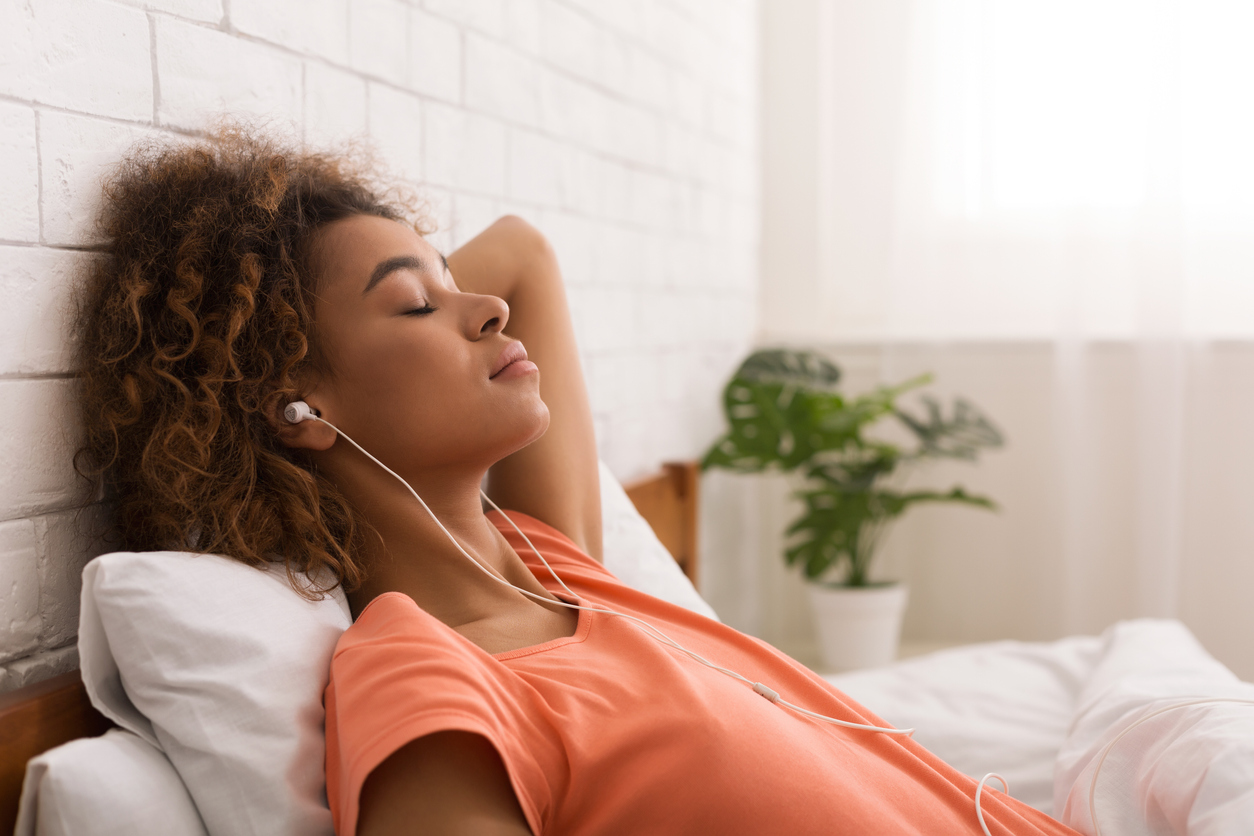Can Listening to Music Help You Sleep?

For most people, the idea of using music as a sleep aid may be strange and even counterproductive. After all, music is most associated with keeping you energized or focused on a task at hand.
However, science suggests that in some cases music’s benefit extends to sleep health, too. Many people may benefit from using music to help them fall asleep, stay asleep longer, and improve their sleep quality.
Let’s find out how.
How does music impact sleep?
Music supports recovery sleep primarily because of its calming effect on the body. Many studies suggest that music may activate parasympathetic activity (the rest, recovery, and digest part of the central nervous system), reduce heart rate, breathing rate, and blood pressure, and produce the same effects as analgesics and sedatives on the body.
Sometimes a poor mood can make it difficult for you to fall asleep. Music has been shown to alleviate depression symptoms and improve mood.
Interestingly, numerous studies have explored the potential effects of music on improving sleep health for many groups of people, and we’ll go through some of them.
An older study explored the effect of music as an intervention for improving sleep in young people who experienced poor sleep.
The researchers noted that music may reduce sympathetic nervous system activity, lower anxiety levels, blood pressure, heart rate, and respiratory rate. It may also help relax the muscles and keep the mind from having intrusive thoughts. When the body is in this state, it’s more able to fall into the sleep zone and have a restful and refreshing night’s rest.
The study’s findings suggest that relaxing classical music may alleviate sleep problems and improve sleep health.
A 2018 study looked at why people listen to music to sleep and why it works for them.
The study observed that music may help ease anxiety and arousal, lift mood, and promote relaxation. What’s more, it noted that many of the participants used music to distract themselves from having negative thoughts that may prevent them from falling asleep.
The participants mentioned other reasons they listened to music during bedtime, stating that music:
- Helps them focus.
- Clears their mind.
- Improves their mood.
- Aids relaxation.
- Provides comfort.
- Supports deep breathing.
- Distracts their mind from intrusive thoughts.
- Blocks out external noise.
- Helps track their sleep duration.
- Shapes their nighttime dream.
- Helps them feel warm and secure.
A 2014 study investigating the effectiveness of music therapy for managing acute and chronic sleep issues found that music may improve the sleep quality of people with sleep disorders.
Not to mention that a study found that music may help people with post-traumatic stress disorder (PTSD) manage their insomnia symptoms. The researchers also noted that music enhances sleep efficiency and reduces depressive symptoms.
In another study on the effects of music on the sleep quality of people with schizophrenia, the researchers found that music improved sleep efficiency and reduced the time it took for them to fall asleep and may be used to improve their sleep quality and emotional health.
The researchers of a 2018 study summarized the mechanism at work that explains why music may improve sleep quality as follows:
- Music may regulate sympathetic nerve activity and decrease stress hormone levels.
- Music may support oxytocin release, a hormone known for its anti-stress effects in aiding feelings of calm and relaxation.
- Music improves mood and supports emotional health.
How long does it take for music to improve sleep quality?
While everyone is different, some research suggests that listening to music every night for at least two to four weeks may lead to positive sleep outcomes.
For instance, evidence shows that sleep problems are common among older adults, and sleep disorders may become more severe. A 2021 study found that older adults may also benefit from music to support restful sleep. The researchers also recommended using sedative music for at least four weeks as a simple and cost-effective intervention for improving sleep quality in older adults.
Similarly, a 2020 study recommends listening to music for at least three weeks to promote healthy sleep in people with mild sleep problems.
Another study found that pregnant women who listened to music at bedtime for two weeks experienced improved sleep quality and lower stress and anxiety levels.
What kind of music works for better sleep?
Many studies support the use of classical music to improve sleep quality. Another study suggests the use of sedative music at bedtime for better sleep.
However, some other studies posit that music that supports healthy sleep depends on each person’s preference. And a person’s favorite kind of music to listen to during bedtime works better for promoting proper sleep than an unfamiliar song.
Interestingly, a study found that a person’s choice of music tuned to a frequency of 432 Hz was more effective for improving sleep than music tuned to 440 Hz.
As many studies have shown, music may benefit many groups, including you, to improve your sleep health. Although the kind of music that may promote sleep is still under debate, generally, consider choosing soothing music. You may also create a playlist of your favorite calming songs to play on repeat at bedtime.
Music is a simple and easily accessible tool for relaxing the body and mind. You can play them from your phone, home audio speaker, or portable speaker. As long as the volume is at moderate levels, it may help you fall asleep and get the refreshing rest you deserve.
If you’re looking for a new idea to implement into your fall-asleep routine, consider adding music in your bedtime routine! You may start to see some benefits and wake feeling more energized and ready to take on your head ahead.